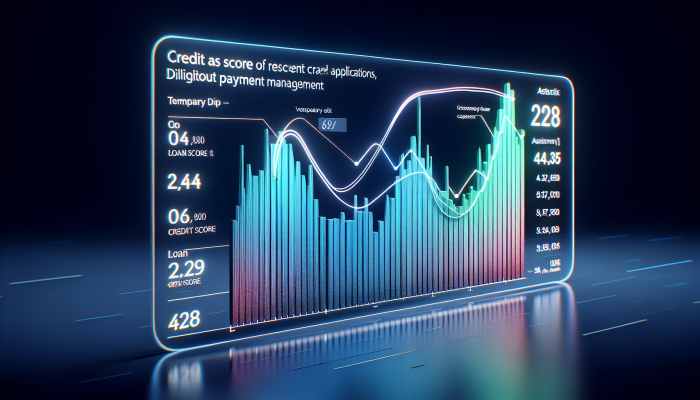Unlocking the Benefits of Debt Consolidation: How It Can Elevate Your Credit Score
Engaging in debt consolidation serves as a powerful financial strategy that can significantly bolster your overall financial well-being. However, grasping how debt consolidation impacts your credit score is essential for making educated choices that pave the way for a stable financial future. By delving into the complexities of your credit score and understanding the critical influence of consolidation, you can adeptly maneuver through your financial landscape with assurance and insight, ultimately leading to enhanced financial health and stability.
Analyzing the Short-Term Effects of Debt Consolidation on Your Credit Score

As you embark on your debt consolidation journey, it is not uncommon to witness a temporary decline in your credit score. This initial drop is typically triggered by hard inquiries that occur when you seek new credit accounts, such as a personal loan or a balance transfer credit card. Lenders perform these inquiries to evaluate your creditworthiness, and each inquiry can result in a brief reduction of a few points in your score. While this decrease may be disconcerting, it is crucial to understand that it is generally a temporary setback rather than a lasting alteration.
Experiencing an initial drop in your credit score can be particularly distressing, especially if you are already navigating financial challenges. However, this decline can be effectively managed by diligently overseeing your consolidated debt and ensuring timely payments. As you consistently fulfill your obligations on the new loan or credit card, the influence of the hard inquiry will diminish, and your score will gradually rise. This phase demands patience and a steadfast commitment to realizing your financial goals.
Boosting Your Credit Utilization Ratio with Debt Consolidation
One of the most notable long-term advantages of debt consolidation is its potential to lower your credit utilization ratio. This vital metric assesses the proportion of your total credit card balances relative to your total available credit, making it a key factor in determining your credit score. A decreased credit utilization ratio indicates to lenders that you manage your credit responsibly, which can significantly enhance your credit profile.
When you consolidate your debts, particularly by paying off high-interest credit cards, you can sharply reduce your outstanding balances. This reduction plays a crucial role in achieving a healthier credit utilization ratio, ideally keeping it below 30%. By maintaining a low utilization rate, you not only boost your credit score but also present yourself as a lower-risk borrower to financial institutions.
Nevertheless, it is imperative to keep this low utilization level intact following consolidation. If you start to accumulate more debt on your credit cards after consolidating, you could undermine the favorable effects on your credit score. Therefore, a disciplined approach to managing your credit after consolidation is critical for achieving enduring financial success.
The Vital Importance of Payment History in Achieving Debt Consolidation Success
Your payment history is the most significant element affecting your credit score, accounting for about 35% of your FICO score. Hence, utilizing debt consolidation to establish an effective payment plan can greatly improve your credit profile. By consolidating your debts, you streamline your obligations into a single monthly payment, making it simpler to stay organized and on top of your financial commitments.
Consistently making on-time payments following consolidation will significantly contribute to your credit score enhancement. Each timely payment adds to your payment history, helping to counterbalance any initial negative effects from hard inquiries. The longer you uphold a strong payment history, the more pronounced its impact becomes in the overall calculation of your credit score.
While this journey may require discipline and determination, the ultimate reward is a healthier credit score and an elevated financial position. Thus, perceiving debt consolidation as a strategic tool rather than a short-term fix can yield remarkable long-term advantages.
Exploring Diverse Debt Consolidation Strategies and Their Effects on Credit Scores

Gaining a thorough understanding of the various debt consolidation strategies is essential, as each approach carries specific implications for your credit score. By examining these options, you can make informed decisions that align with your financial objectives and personal circumstances, leading to better financial outcomes.
Employing Personal Loans as a Strategic Tool for Debt Consolidation
Personal loans are a popular choice for debt consolidation, enabling you to combine multiple high-interest debts into a single loan with a fixed interest rate. This method can yield mixed results on your credit score. When you apply for a personal loan, it triggers a hard inquiry, which may result in a minor decrease in your score. However, as you start making regular payments, the positive impact on your credit score can be substantial.
Additionally, personal loans generally offer lower interest rates compared to credit cards, allowing you to save money on interest payments while effectively decreasing your overall debt. As you pay down your consolidated debt, your credit utilization ratio improves, further enhancing your credit score over time.
However, it is crucial to avoid accruing new debt while repaying your loan. This practice ensures that you maximize the benefits of debt consolidation while maintaining a healthy credit score and avoiding additional financial strain.
Utilizing Balance Transfer Credit Cards for Successful Debt Consolidation
Balance transfer credit cards offer an attractive option for consolidating debt. They allow you to transfer high-interest credit card balances to a new card that provides a lower interest rate, often featuring an introductory 0% APR. This strategy can substantially reduce your interest payments, although it comes with specific credit score considerations.
Applying for a balance transfer card will result in a hard inquiry, which can temporarily affect your credit score. However, if you manage to pay off your transferred balance within the promotional period, you can achieve significant savings. Furthermore, this approach has the potential to lower your credit utilization ratio, positively influencing your score, provided you keep your other credit card balances low.
Conversely, failing to pay off the balance before the promotional period expires may lead to a sharp increase in the interest rate, resulting in higher payments that could strain your finances. Additionally, maxing out your new balance transfer card can negatively impact your credit utilization ratio, leading to detrimental effects on your score.
Leveraging Home Equity Loans for Efficient Debt Consolidation

Home equity loans present another avenue for debt consolidation, utilizing the equity in your home as collateral to secure a loan. This choice often provides lower interest rates, which is beneficial for managing high-interest debts, yet it also carries distinct risks and implications for your credit score.
While a home equity loan can assist in lowering your credit utilization ratio and enhancing your score, the potential risk of losing your home in the event of default is considerable. Similar to other consolidation methods, applying for a home equity loan will result in a hard inquiry, which temporarily reduces your credit score.
It is vital to carefully evaluate your entire financial situation prior to pursuing this option. If you are confident in your ability to manage the payments and avoid incurring additional debt, a home equity loan can serve as a valuable resource for consolidating debt while simultaneously improving your credit score.
Effective Strategies to Mitigate Negative Impacts on Your Credit Score
Implement the following strategies to ensure that your debt consolidation experience enhances, rather than hinders, your credit score. These practices will assist you in navigating the complexities of consolidation while safeguarding your financial health and improving your credit profile.
Identifying the Most Suitable Debt Consolidation Method for Your Specific Needs
Selecting the most effective debt consolidation method is crucial for minimizing adverse effects on your credit score. Take the necessary time to evaluate various approaches, weighing their advantages and disadvantages against your unique financial situation.
For instance, a personal loan may be a viable option if you have a stable income and a favorable credit profile due to its generally lower interest rates. Alternatively, a balance transfer credit card with a lower limit might be more advantageous if your credit is not stellar, offering you a chance to consolidate without incurring significant extra costs.
Conduct thorough research on different lenders, scrutinize the fine print, and ensure you fully understand the terms and conditions associated with each option. This diligence empowers you to choose a method that aligns with your financial aspirations while minimizing any adverse impact on your credit score.
Maintaining a Low Credit Utilization Ratio After Consolidation
Once you have completed your debt consolidation, it is critical to keep a low credit utilization ratio to protect your credit score. One effective strategy is to avoid incurring new debt on your credit cards while paying off your consolidated loan. This approach helps maintain a low credit utilization ratio, which positively influences your credit score.
Additionally, consider utilizing budgeting tools to monitor your spending habits and ensure that you are living within your means. By keeping low credit card balances and making timely payments, you reinforce a positive credit history, which lenders highly appreciate and favor.
Another practical tactic is to request credit limit increases on your existing credit cards. This can enhance your overall available credit, thereby reducing your credit utilization ratio, as long as you refrain from increasing your spending in the process.
Building a Strong Payment History to Improve Your Credit Score
A robust payment history is fundamental to enhancing your credit score following debt consolidation. Throughout the debt consolidation process, commit to making consistent, on-time payments. This dedication will not only elevate your credit score but also instill a sense of financial discipline that can benefit you in the long run.
Consider setting up automatic payments for your consolidated loan or credit card to ensure you never miss a due date. Regularly monitoring your accounts can provide additional peace of mind, allowing you to address any potential issues before they escalate into larger problems.
Remember, a positive payment history signals to lenders that you are a responsible borrower. Over time, this can lead to increased creditworthiness and the potential for more favorable loan terms, ultimately benefiting your financial situation.
Real-Life Illustrations: The Impact of Debt Consolidation on Credit Scores
To fully comprehend the effects of debt consolidation on credit scores, let us examine real-life case studies and scenarios. These examples will illustrate how individuals have navigated the complexities of consolidation and the resulting impacts on their credit scores.
Case Study: Overcoming High-Interest Credit Card Debt
Consider Jane, who was burdened with overwhelming high-interest credit card debt. With several cards maxed out and monthly payments spiraling out of control, Jane decided to pursue a personal loan for debt consolidation.
Initially, Jane’s credit score dropped due to the hard inquiry from her loan application. However, as she diligently made timely payments on her new loan, her credit score began to recover. Within a year, her credit utilization ratio decreased significantly, resulting in a noticeable enhancement of her credit score.
Through disciplined financial management, Jane successfully transformed her financial landscape, leveraging debt consolidation to regain control over her credit and financial future.
Case Study: Streamlining Student Loan Payments for Enhanced Management
A recent graduate, Mark, faced the challenge of juggling multiple student loans with differing interest rates. He opted for student loan consolidation to simplify his payments and potentially lower his interest costs.
Initially, Mark experienced a slight decline in his credit score due to the hard inquiry associated with his consolidation efforts. However, his credit score gradually improved as he made steady payments on the consolidated loan. Mark maintained a healthy credit utilization ratio by avoiding additional debt, demonstrating the positive ramifications of consolidation on his credit profile.
This case exemplifies how strategic debt consolidation can yield favorable outcomes for credit scores, particularly for young borrowers striving for financial stability.
Case Study: Effectively Managing Multiple Small Debts
Sarah had accrued several small debts from personal loans and credit cards. She selected a balance transfer credit card featuring an introductory 0% APR to consolidate these obligations.
While her credit score temporarily declined due to the hard inquiry, Sarah successfully paid off her transferred balance before the promotional period concluded. As a result, her credit utilization ratio improved, and her credit score steadily increased.
Sarah’s experience underscores the importance of effectively managing consolidation strategies and illustrates the significant potential for improved credit scores through disciplined financial habits and strategic decision-making.
Clearing Up Common Misconceptions About Debt Consolidation and Credit Scores
As with any financial topic, numerous misconceptions surround debt consolidation and its effects on credit scores. Let’s clarify some of the prevailing myths to gain a better understanding of this financial strategy and its implications.
Myth: Debt Consolidation Always Leads to a Lower Credit Score
A widespread belief is that debt consolidation inherently results in decreased credit scores. While it is true that hard inquiries can temporarily affect your score, debt consolidation can ultimately foster long-term improvements. By concentrating on responsible payment habits and reducing your credit utilization ratio, you can significantly enhance your credit profile over time.
Understanding this nuance is crucial for making informed decisions about your debt management strategies and appreciating the potential benefits of consolidation.
Myth: All Debt Consolidation Methods Yield Identical Results
Another common misconception is that every debt consolidation method produces the same effects on your credit score. Different options—personal loans, balance transfers, and home equity loans—carry unique implications for your credit profile, each with its own set of advantages and disadvantages.
It is essential to evaluate these methods based on your individual financial circumstances and goals. A tailored approach to debt consolidation can maximize its benefits for your credit score and overall financial wellbeing.
Myth: Debt Consolidation Erases Your Debt History
Some individuals mistakenly believe that debt consolidation erases their debt history, providing a clean slate. In reality, consolidating your debts does not eliminate your past payment history or existing balances; it merely combines them into a more manageable form.
Your credit report will still reflect your previous debts, and responsible management of the consolidated debt is essential for demonstrating your creditworthiness. Recognizing this fact can help you approach debt consolidation with realistic expectations and a commitment to sound financial practices.
Addressing Common Queries About Debt Consolidation and Its Effects on Credit Scores
How Long Will It Take for My Credit Score to Recover After Consolidation?
Your credit score can typically take several months to bounce back following debt consolidation. The recovery time varies based on your payment habits and overall credit utilization, as well as other factors impacting your financial situation.
Can Debt Consolidation Improve My Chances of Securing Better Loan Rates?
Absolutely! Consolidating your debt can enhance your credit score, making you a more appealing borrower. This improvement may qualify you for better loan rates and terms.
What Should I Do If My Credit Score Drops After Consolidation?
If you observe a decrease in your credit score following consolidation, focus on making timely payments and maintaining low credit utilization. Over time, these proactive measures can aid in rebuilding your score and enhancing your overall financial standing.
Is Debt Consolidation Suitable for Everyone?
Debt consolidation may not be the ideal strategy for every individual. It is essential to evaluate your financial situation, including your debts, income, and spending habits, before determining if this approach is suitable for you and your specific goals.
Can I Consolidate Student Loans and Credit Card Debt at the Same Time?
While both student loans and credit card debts can be consolidated, they usually require different methods. To optimize potential benefits, consider specific options tailored to each type of debt, ensuring you make the most informed decisions.
Will Debt Consolidation Affect My Ability to Obtain New Credit?
Initially, debt consolidation may influence your ability to secure new credit due to hard inquiries. However, with responsible management of consolidated debt, your creditworthiness can improve over time, enhancing your prospects for future credit applications.
Are There Fees Linked to Debt Consolidation?
Certain debt consolidation methods may entail fees, such as balance transfer or loan origination fees. It is crucial to be aware of these costs before proceeding with consolidation to ensure you thoroughly understand the financial implications.
How Can I Identify a Reliable Debt Consolidation Service?
Research and compare various debt consolidation services, focusing on reviews and ratings from reputable sources. Ensure the service is transparent about fees and offers a realistic plan for managing your debts to help you make an informed choice.
Is It Possible to Consolidate Debts Without a Strong Credit Score?
While a solid credit score simplifies consolidation, options are available for those with poor credit. Consider secured loans or collaborating with credit counselors to devise personalized strategies that fit your financial situation.
Can Debt Consolidation Be a Long-Term Solution?
Debt consolidation can be part of a long-term financial strategy, but it requires ongoing discipline and responsible financial management. Utilize it as a stepping stone towards a healthier financial future and a more stable credit profile.
Connect with Us on Facebook
This Article Was First Found On: https://www.debtconsolidationloans.co.uk
The Article Debt Consolidation’s Impact on Your Credit Score Was Found On https://limitsofstrategy.com